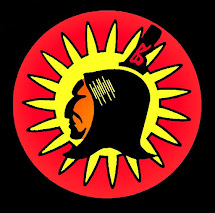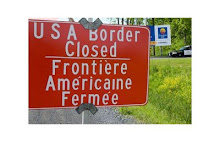Tuesday, April 15, 2014
Who You Calling Formerly Colonized?
During the past week I have had more
conversations about "decolonization" than I have had in my whole
life. As I mentioned in one of my Facebook conversations, I am not entirely comfortable
with the expression.
Clearly as Native people continue to
carve out our existence with the dominant societies, cultures and politics
around us, we find ourselves getting caught up in the next word, policy or
social theory of the day. Sovereignty became almost synonymous with Native rights.
Self-governance and self-determination also began rolling off the tongues of
every "tribal leader" and "Indian expert." Oh yeah, and
let's not leave out “nation-to-nation” and “government-to-government”
relations. Those were good ones.
For me, the "trust
relationship" with a complete lack of the "trust" part makes
that one problematic for me but that one was easy to call. This decolonization
thing was a little more troublesome for me. I mean, I get it and the whole
"decolonize your mind" slogan does have a nice ring to it but for me
it still didn't feel right.
I was finally able to put my finger
on it today when my good friend Kerry Hawk Lessard used University of Michigan
Associate Professor of Psychology and American Culture Joseph Gone's definition
in our discussion. Gone uses decolonization to describe “the intentional,
collective, and reflective self-examination undertaken by formerly colonized
peoples that results in shared remedial action.”
Well, there you have it. Decolonization felt to me a little
too much like the abolition movement and Gone confirmed the problem for me.
Just like abolition was all about addressing and ending the very successful
dehumanizing institution that was American slavery, decolonization is about
remediating the problems associated with "formerly colonized peoples"
as though the act of colonization was both complete and successful.
I understand that colonization is a clear and well-defined
concept, but at its core it is about claiming land. Just as the Doctrine of
Christian Discovery really had nothing to do with converting the pagans into
Christians but rather converting their land to Christendom, colonization was
less about colonizing people and more about taking their land for the
colonizer.
So having said that, I certainly acknowledge that almost all
of our lands were stolen, defrauded, claimed and/or swindled from us for THEIR
colony and most Native communities, on either side of the imaginary line (U.S./Canadian
border) are led to believe their lands are held "in trust" for them
by the colonial powers. But the keyword here is "most" — not all.
One of the little-known facts about Native people is that 70 percent
of them do not live on Native lands and most of the remaining percent that do,
live on lands that the colonizers claim to hold the title to. But that is not
the case for the Haudenosanee territories I have lived on. Although our
ancestral lands have been greatly reduced, all of the peoples of the
Haudenosaunee still retain a portion of those once vast lands and they OWN it.
The lands of which I speak are not under U.S. or state title.
And they are not "held for the use and enjoyment" of our people. Our
people OWN them. So to say it more clearly and in the context of this
discussion — our land is not part of their colony. The land we still occupy has not been colonized.
Now I am not suggesting that we are the only people who can
claim to have not been colonized but I would say that if they can't claim our
lands then they can't claim us. I will also state for the record that I have
never ascribed to the notion that the U.S. and Canada hold our lands for us. But
I will say if you view yourself among the formerly colonized peoples then the
first step you need to take is to assert your connection to your homeland.
Beyond the inability of the colonial powers to render us
landless, I maintain that there is no legal basis to claim our subjugation or
cite just when our clearly recognized sovereignty was ever transferred to them.
It is laughable that the foundation of U.S and Canadian "federal Indian
law" is still ONLY based on papal bulls from the fifteenth century. In
1823 when the U.S. codified the Doctrine of Christian Discovery into U.S. law
via Johnson v. M'Intosh, Chief Justice
John Marshall literally suggested that Native sovereignty was diminished upon
discovery. And in the wake of Marshall's legal dicta on this ruling there began
this absurd assumption that discovery could be viewed as tantamount to
conquest.
Of course, even with this weak rationale building the foundation
for the imperialistic belief in Manifest Destiny, neither the U.S. nor the state
of New York ever claimed to own the land we retained. In fact, even when
attempting to relocate the Seneca during the Removal Act era, the U.S. was
forced to include language in its offer of lands west of the Mississippi that
even those lands would never be claimed by the U.S. or incorporated into any
state (an offer that was nonetheless rejected). As late as the second half of
the nineteenth century, New York State still acknowledged in its State Judicial
Reports that Seneca lands were not part of the state, that the Seneca were not
represented in their legislature and that the state could not tax them.
I have many reasons for refusing to be considered a formerly
colonized person. I maintain that there are many of us that are among a long
line of people who have resisted and rejected subjugation and the assumption of
colonization. So excuse me for not embracing the decolonization movement. My
sovereignty is a birthright. That whole unalienable rights thing? That came
from us. The concept of seven generations doesn't just suggest that we consider
the effects of our actions on those unborn faces — it prohibits and denies any
legal and legitimate authority of anyone to sell out their future generations.
I can't decolonize. That would suggest that I was colonized
in the first place. I wasn't and I'm not.
Subscribe to:
Post Comments (Atom)














![-[]-[]-/\-[]-[]-](https://blogger.googleusercontent.com/img/b/R29vZ2xl/AVvXsEjLoXmKO8PJVQ5pZ2q7GX7nFKw8H2tb28dxt-o10FUBNtOGszWhWoLB7tgjtMgtISpuSxNW3fcDxfuSS2DqojsdjNJ1lVggyUS374PnzsDbOhk4ukvtTunFQcyfkckZeBzcLbri4LDYN_E/s214/29-03-A-voice-from-the-Akw-.jpg)





No comments:
Post a Comment